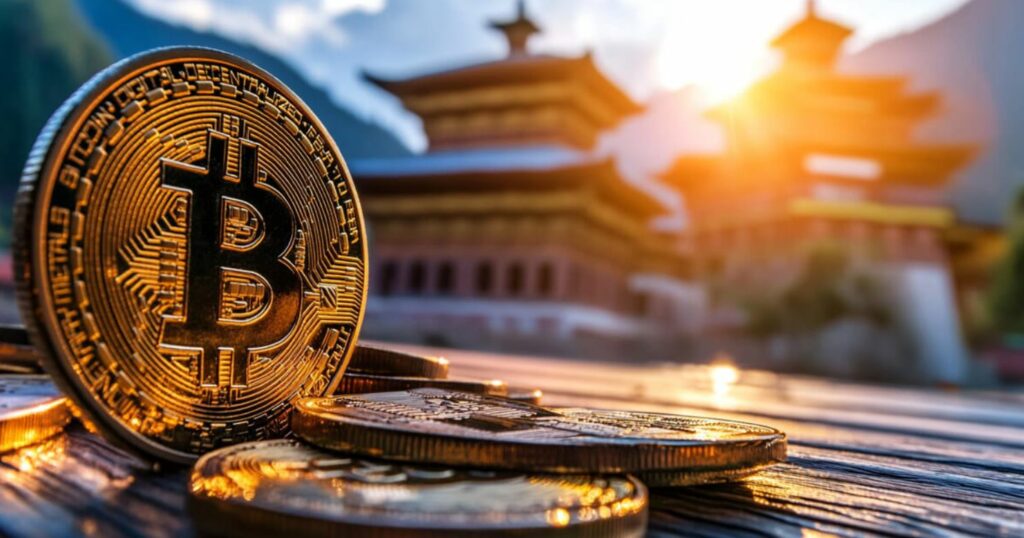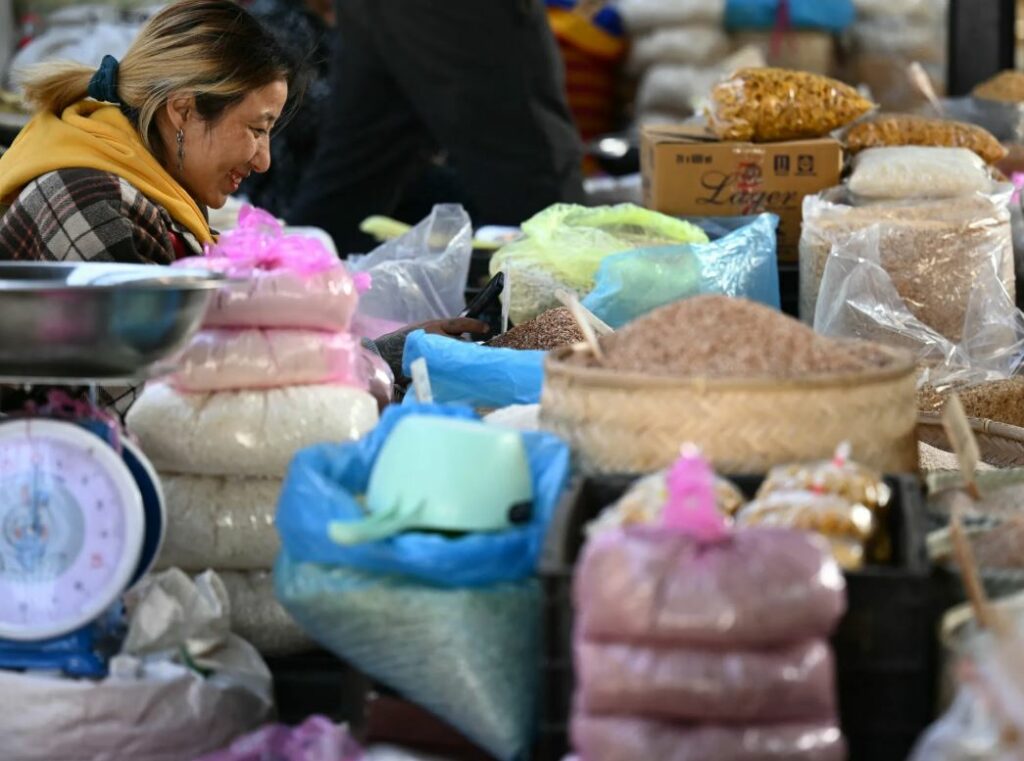
Bhutan, a small Himalayan kingdom, is known for measuring progress in an unusual way — not by GDP alone, but by Gross National Happiness. The country is famous for its clean environment, focus on well-being, and its carbon-negative status. But today, Bhutan is facing serious economic challenges. And to solve them, it has turned to an unexpected tool: Bitcoin.

Bhutan’s Economic Struggles
Bhutan is a landlocked country between India and China. With a population of just 800,000, the country has a small economy. Most of its land is mountainous and not suitable for farming. Bhutan imports most of its food and goods from India.
Tourism is an important part of Bhutan’s economy. It contributes more than 10% of the country’s GDP. In 2023, tourism earned Bhutan $334 million, according to the Royal Monetary Authority. The country’s total GDP in 2023 was $3.02 billion.
However, tourism is still recovering after the COVID-19 pandemic. Bhutan only welcomed about 150,000 tourists in 2023, even though it can host up to 300,000 visitors each year. The government charges a sustainable development fee of $100 per day for most tourists, except for those from India, who pay just $15.
At the same time, youth unemployment is a growing concern. In 2024, the unemployment rate for young people in Bhutan was 19%, compared to the global average of 13.6%. Many young, educated Bhutanese are leaving the country for better job opportunities abroad. In 2022, over 10% of Bhutan’s skilled population migrated, especially to countries like Australia.
This brain drain has hit Bhutan’s civil service hard. Thousands of government workers have resigned since 2019. In the first quarter of 2023 alone, nearly 1,900 civil servants quit. This number dropped to 500 in the first quarter of 2024, thanks to a major policy shift by the government.

The Bitcoin Strategy
To fight the economic crisis and stop the talent exodus, Bhutan has turned to cryptocurrency. Specifically, it has chosen to invest heavily in Bitcoin mining. Bitcoin is the world’s first and most valuable cryptocurrency, created in 2008. It operates on a blockchain, a digital ledger where transactions are recorded.
There is a fixed supply of 21 million Bitcoins. Most have already been mined, and only about one million remain. Mining is the process of creating new Bitcoins by solving complex math problems using high-powered computers. This process requires a lot of energy.
Bhutan is uniquely positioned to mine Bitcoin sustainably. The country produces more hydropower than it uses, especially during the summer months when water flow increases. This excess green energy is now being used to run powerful computers that mine Bitcoin.
“It’s just a simple strategic choice that many people have made and earned billions of dollars,” said Bhutan’s Prime Minister Tshering Tobgay in March 2025. “And I think governments should do it.”
How Bitcoin Helped Civil Servants
In 2023, the Bhutanese government made headlines by selling $100 million worth of cryptocurrency. The goal was to double the salaries of civil servants. This move appears to have had an immediate effect. As mentioned earlier, fewer civil servants resigned in 2024 compared to the previous year.
This step was part of a larger plan to stabilize the economy and keep skilled workers in the country. It also signals a shift in Bhutan’s attitude toward modern financial tools.
How Much Bitcoin Does Bhutan Hold?
The exact amount of Bitcoin owned by Bhutan has not been officially disclosed. However, according to blockchain analytics firm Arkham, Bhutan’s Bitcoin holdings are worth over $600 million as of April 9, 2025. That’s about 30% of the country’s GDP.
Arkham also reported that Bhutan owns smaller amounts of other cryptocurrencies like Ethereum and LinqAI.
This information highlights Bhutan’s strong commitment to cryptocurrency. It also shows how serious the country is about using digital assets to support its national economy.
Is Bitcoin Mining Sustainable in Bhutan?
One major criticism of Bitcoin mining is that it uses a lot of energy. But in Bhutan’s case, the mining process is powered by clean hydropower. This makes it one of the most sustainable crypto mining operations in the world.
Bhutan’s climate also helps. With average yearly temperatures between 15°C to 30°C (59°F to 86°F), the need for cooling systems in mining facilities is lower. This reduces energy use even more.
Ujwal Deep Dahal, the CEO of Druk Holding and Investments – the government’s commercial arm – said that it’s important for Bhutan to “capitalize on the green energy we have” by mining Bitcoin.
Bhutan already exports hydroelectricity to India. But if electricity prices are not favorable, Bhutan uses that power to mine Bitcoin instead. “Instead of exporting [hydropower] at a very cheap rate, we are using it to mine Bitcoins in the high mountains of Bhutan,” said Tenzing Lamsang, editor-in-chief of The Bhutanese newspaper.

A New Tech Hub: Gelephu Mindfulness City
In addition to Bitcoin mining, Bhutan is planning a new smart city to drive economic growth. The Gelephu Mindfulness City will combine sustainability, technology, and business. The project includes low-rise buildings, green businesses, residential areas, a national park, and a wildlife sanctuary.
This city is meant to attract global investors and support Bhutan’s vision of “high-value and low-volume” growth. It reflects the country’s desire to modernize while still protecting its environment and cultural values.
What Are Other Countries Doing?
Bhutan is not alone in exploring crypto. Other governments are starting to see the value of Bitcoin.
On March 6, 2025, U.S. President Donald Trump created a national Bitcoin reserve. A day earlier, El Salvador announced it holds $550 million in Bitcoin.
Other countries like the Central African Republic and France are also recognizing Bitcoin as legal tender.
Meanwhile, Pakistan is working to become a crypto leader in South Asia. On April 7, 2025, Pakistan named Binance founder Changpeng Zhao as an adviser to its new Pakistan Crypto Council (PCC).
Bhutan’s bold move into Bitcoin mining shows how digital currencies can play a role in a country’s economic recovery. By using its natural resources, especially clean energy, Bhutan is mining Bitcoin in a sustainable way. The strategy has helped raise public sector salaries, slow down brain drain, and attract global attention.
Still, risks remain. Bitcoin prices are known to rise and fall quickly. But for now, Bhutan’s bet on crypto seems to be paying off.
As Prime Minister Tobgay said, “We must be careful with what we allow into our country, but we must also be open to innovation that fits our values.”























